Daily Vocabulary Words: List of Daily Used Words
Hi there. Welcome to this special section @ Wordpandit.
Our endeavour here is straightforward: highlighting important daily vocabulary words, you would encounter in The Hindu. This is your repository of commonly used words; essentially, we are posting a list of daily used words. Hence, this has significant practical application as it teaches you words that are commonly used in a leading publication such as The Hindu.
Visit the website daily to learn words from The Hindu.
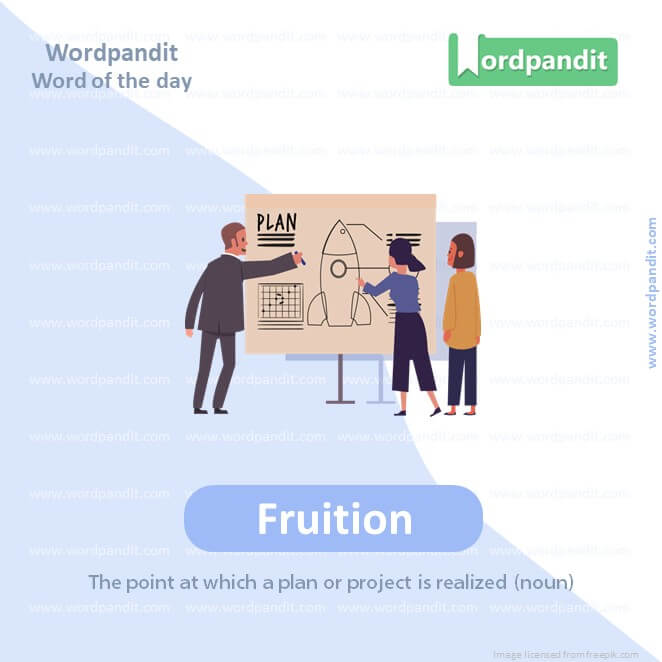
WORD-1: Fruition
CONTEXT: The desperation of social conservatives to establish caste-class exclusivism in academic campuses will see fruition if right-wing populism remains at the helm.
SOURCE: The Hindu
EXPLANATORY PARAGRAPH: Imagine you plant a seed and take care of it every day. After some time, it grows into a beautiful flower. That’s like seeing your hard work turn into something wonderful. Fruition is when something you have been working on or hoping for finally happens, and you can see the result of your efforts.
MEANING: The point at which a plan or project is realized (noun).
PRONUNCIATION: froo-IH-shun
SYNONYMS: Realization, Achievement, Completion, Success, Fulfillment.
USAGE EXAMPLES:
1. After years of hard work, her dream of becoming a doctor came to fruition.
2. The garden they planted in spring came to fruition with beautiful flowers and vegetables.
3. His idea for a new invention finally reached fruition after many trials.
4. The fruition of their efforts was evident in the successful charity event.
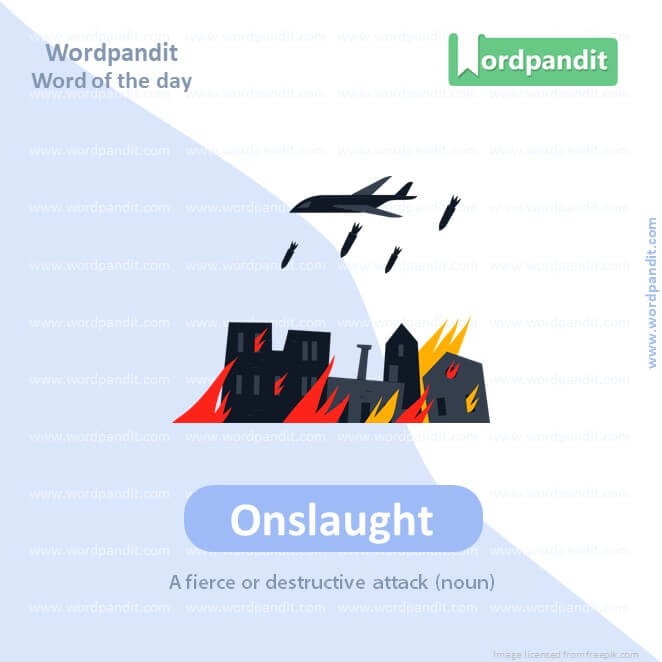
WORD-2: Onslaught
CONTEXT: The resistance to this onslaught must be more prudent. If our adherence to political correctness crosses a threshold level, the liberal fabric would be pummelled by the social oligarchs.
SOURCE: The Hindu
EXPLANATORY PARAGRAPH: Imagine a lot of things coming at you all at once, like a bunch of balls being thrown towards you quickly. Onslaught is like that. It’s when a large number of things come at you all at once, and it can be a bit overwhelming.
MEANING: A fierce or destructive attack (noun).
PRONUNCIATION: ON-slawt
SYNONYMS: Attack, Assault, Barrage, Blitz, Offensive.
USAGE EXAMPLES:
1. The small village was not prepared for the onslaught of the storm.
2. The soccer team faced an onslaught of goals from their opponents.
3. They withstood an onslaught of questions from the reporters.
4. The garden was suffering under the onslaught of pests.
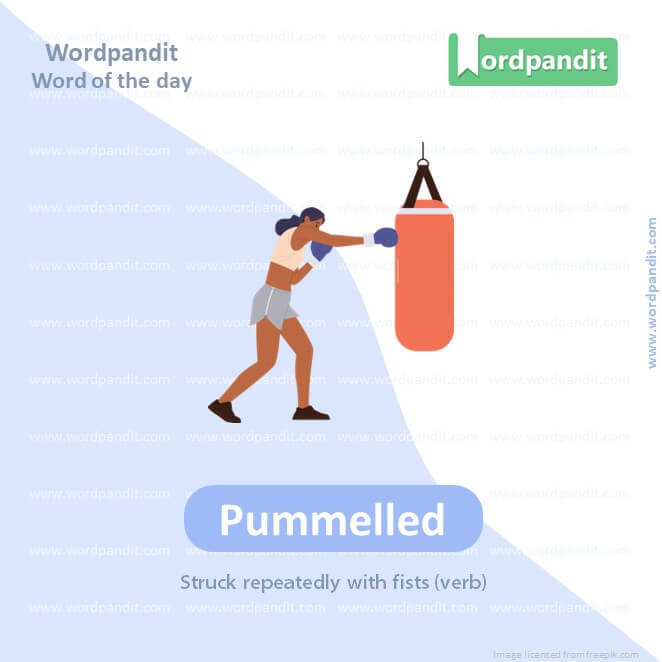
WORD-3: Pummelled
CONTEXT: The resistance to this onslaught must be more prudent. If our adherence to political correctness crosses a threshold level, the liberal fabric would be pummelled by the social oligarchs.
SOURCE: The Hindu
EXPLANATORY PARAGRAPH: Imagine someone hitting something over and over again, like when you’re punching a soft pillow. Pummelled means to hit something many times, usually quite hard.
MEANING: Struck repeatedly with fists (verb).
PRONUNCIATION: PUH-muld
SYNONYMS: Beat, Pound, Thrash, Wallop, Hammer.
USAGE EXAMPLES:
1. The boxer pummelled his opponent in the ring.
2. The waves pummelled the side of the boat during the storm.
3. He pummelled the dough with his fists while making bread.
4. The hailstorm pummelled the rooftops loudly.
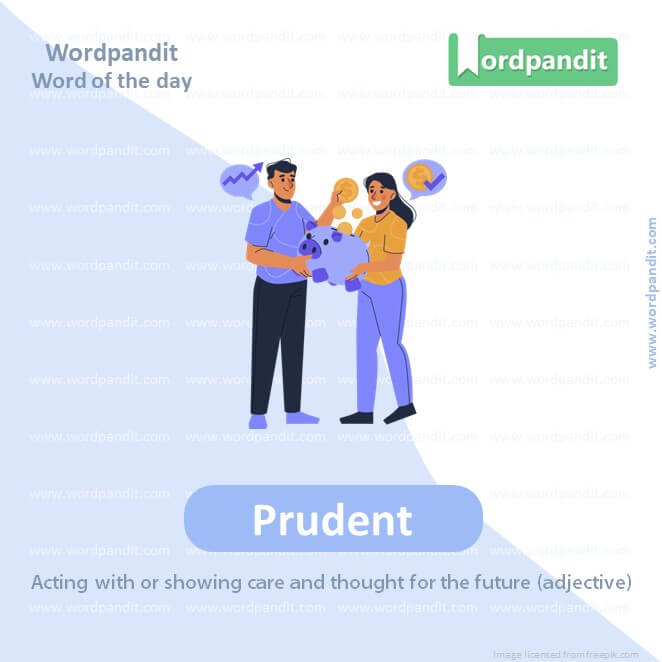
WORD-4: Prudent
CONTEXT: The resistance to this onslaught must be more prudent. If our adherence to political correctness crosses a threshold level, the liberal fabric would be pummelled by the social oligarchs.
SOURCE: The Hindu
EXPLANATORY PARAGRAPH: When you think carefully before doing something to make sure it’s a good idea, that’s being prudent. It’s like looking both ways before you cross the street to be safe.
MEANING: Acting with or showing care and thought for the future (adjective).
PRONUNCIATION: PROO-dent
SYNONYMS: Wise, Cautious, Careful, Sensible, Judicious.
USAGE EXAMPLES:
1. It was a prudent decision to save some of her birthday money.
2. The hiker took a prudent amount of supplies for the journey.
3. Being prudent, she checked the weather forecast before leaving.
4. They made a prudent investment that paid off years later.
WORD-5: Cognitive
CONTEXT: When our ability to falsify our own propositions remains unassailable, the real cognitive contribution begins in academia.
SOURCE: The Hindu
EXPLANATORY PARAGRAPH: Cognitive is about how we think, learn, and remember. When you solve puzzles, remember a story, or think about something, your brain is using its cognitive skills.
MEANING: Related to the process of knowing, including aspects such as awareness, perception, reasoning, and judgment (adjective).
PRONUNCIATION: KOG-ni-tiv
SYNONYMS: Mental, Intellectual, Thinking, Reasoning, Perceptual.
USAGE EXAMPLES:
1. The puzzle games are good for your cognitive development.
2. She attended a workshop to improve her cognitive skills.
3. The disease affected his cognitive abilities.
4. Cognitive psychology studies how people think and learn.
WORD-6: Denouement
CONTEXT: the inflated strength of right-wing populism, unscrupulous political correctness would be singularly responsible for the denouement of our public academic institutions.
SOURCE: The Hindu
EXPLANATORY PARAGRAPH: Denouement is a fancy word for the end of a story when you find out how everything finishes and all the secrets are told. It’s like when you get to the last page of a book, and everything makes sense.
MEANING: The final part of a play, movie, or narrative in which the strands of the plot are drawn together, and matters are explained or resolved (noun).
PRONUNCIATION: day-noo-MAHN
SYNONYMS: Conclusion, Finale, Resolution, Climax, Wrap-up.
USAGE EXAMPLES:
1. The movie’s denouement was both surprising and satisfying.
2. The mystery novel had a complex denouement that tied up all the loose ends.
3. Everyone awaited the denouement of the long-running TV series.
4. The denouement of the play left the audience in tears.
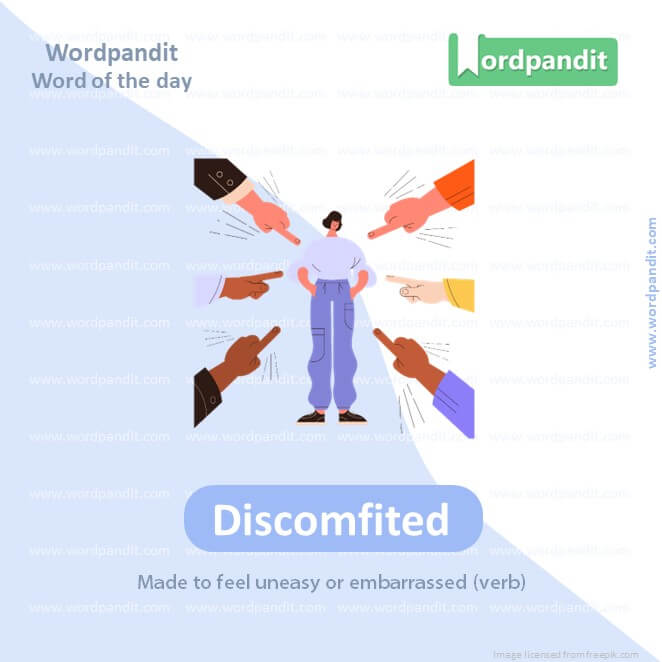
WORD-7: Discomfited
CONTEXT: The reporter, discomfited perhaps at my tone and at the gender-identifying words, removed all pronouns.
SOURCE: The Hindu
EXPLANATORY PARAGRAPH: Imagine feeling uncomfortable or embarrassed, like when you can’t find your toy and someone helps you. Discomfited is when you feel uneasy or upset, especially in a situation where you’re not sure what to do.
MEANING: Made to feel uneasy or embarrassed (verb).
PRONUNCIATION: dis-KUM-fit-ed
SYNONYMS: Embarrassed, Unsettled, Disturbed, Flustered, Disconcerted.
USAGE EXAMPLES:
1. He was discomfited by the awkward silence at the dinner table.
2. The unexpected question left her feeling discomfited.
3. The rude remarks discomfited the guests.
4. She felt discomfited in the unfamiliar surroundings.
WORD-8: Commemorate
CONTEXT: It was an LGBTQAI+ centred story that we were considering doing to commemorate Pride Month, in June.
SOURCE: The Hindu
EXPLANATORY PARAGRAPH: Commemorate is when you do something special to remember an important person or event. It’s like having a party on your birthday to remember the day you were born.
MEANING: To honor the memory of someone or something in a special way (verb).
PRONUNCIATION: kuh-MEM-uh-rate
SYNONYMS: Celebrate, Remember, Honor, Mark, Memorialize.
USAGE EXAMPLES:
1. They planted a tree to commemorate their grandfather.
2. The ceremony was held to commemorate the 100th anniversary of the school.
3. A plaque was unveiled to commemorate the battle that took place here.
4. The festival is held annually to commemorate the town’s founding.
WORD-9: Periphery
CONTEXT: It is the people who live on the periphery of society, the many minorities, who have stories to tell — stories laden with grief, pain, shame, guilt, longing, fear.
SOURCE: The Hindu
EXPLANATORY PARAGRAPH: Periphery is like the edge or border of something. If you’re standing at the edge of a playground, you’re on the periphery. It’s not the center, but the part all the way around the outside.
MEANING: The outer limits or edge of an area or object (noun).
PRONUNCIATION: puh-RIF-uh-ree
SYNONYMS: Edge, Border, Boundary, Fringe, Outskirts.
USAGE EXAMPLES:
1. The small shops are located on the periphery of the town.
2. He noticed a figure standing at the periphery of his vision.
3. Trees were planted around the periphery of the park.
4. The periphery of the circle was decorated with colorful stones.
WORD-10 Harrowing
CONTEXT: on January 8, the Supreme Court of India delivered a landmark ruling in the harrowing case of Bilkis Bano.
SOURCE: The Hindu
EXPLANATORY PARAGRAPH: Harrowing is a word used to describe something very scary or upsetting, like a nightmare. It’s the kind of feeling you get when something really frightens or worries you a lot.
MEANING: Extremely distressing or disturbing (adjective).
PRONUNCIATION: HAR-row-ing
SYNONYMS: Traumatic, Distressing, Terrifying, Shocking, Alarming.
USAGE EXAMPLES:
1. She told a harrowing tale of survival in the wilderness.
2. The harrowing experience left him shaken for days.
3. The movie was harrowing, but it had a powerful message.
4. The news reported the harrowing details of the accident.
Vocabulary PDF
In the digital age, the way we learn languages has transformed dramatically. Among the myriad of resources at our disposal, a ‘vocabulary PDF’ serves as an incredibly effective tool. It offers a structured, accessible and convenient method of enhancing our language skills. To maximize the potential of ‘vocabulary PDF’, it is crucial to understand how to make the most of it.
First off, when venturing through the process of learning with a ‘vocabulary PDF’, maintaining consistent learner engagement is pivotal. This involves regular revision sessions where you consistently go back and refresh your memory about previously learned words. This cyclic process is particularly effective in promoting long-term retention of the vocabulary.
While leveraging a ‘vocabulary PDF’, it’s also beneficial to annotate as you progress. Annotation brings an interactive aspect to your learning, making it dynamic and personalized. Make notes of context, synonyms, antonyms, or even create sentences using the new words. This engagement with the ‘vocabulary PDF’ aids in imbibing the meaning and usage of the words.
Another strategic approach to mastering a ‘vocabulary PDF’ is to utilize a reading aloud technique. Listening to the words as you speak them out loud can stimulate auditory learning, enhancing your pronunciation and comprehension of the vocabulary.
When using a ‘vocabulary PDF’, it is also advantageous to supplement your learning through applications of the new words. Write an essay, engage in a conversation, or post on social media using the new words. This reinforces the acquired vocabulary, augmenting your grasp over them.
In conclusion, a ‘vocabulary PDF’ is a potent instrument that, when harnessed effectively, can significantly bolster your language learning journey. It requires a blend of consistent revision, active annotation, auditory engagement, and practical application. With these strategies in hand, mastering ‘vocabulary PDF’ can be a rewarding and successful experience that fuels your linguistic endeavors.













